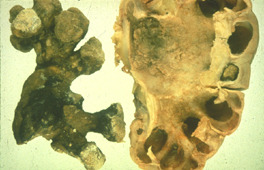Calcium buildup in the kidneys can cause a condition known as Staghorn Calculus. This is a painful condition that primarily affects Asians, and can also be called a branched kidney stone. It is caused by a combination of genetic factors and lifestyle habits, including diet, exercise, and exposure to environmental toxins.
What is Staghorn Calculus?
Staghorn calculus is a condition where the kidneys develop blockages due to a buildup of calcium or other minerals. These blockages can cause severe pain and discomfort, and can also lead to complications such as kidney infection or failure. Staghorn calculi are more common in Asians, and can be difficult to treat without surgery.
What Causes Staghorn Calculus?
The exact cause of Staghorn Calculus is not yet known. However, researchers believe that a combination of genetic and environmental factors can contribute to its development. Some of the most common risk factors for Staghorn Calculus include:
- Family history: Staghorn Calculus tends to run in families, which suggests a genetic component to the condition.
- Diet: Eating a diet high in salt, animal protein, and calcium can increase the risk of developing Staghorn Calculus.
- Dehydration: Not drinking enough water can cause minerals to build up in the kidneys, leading to Staghorn Calculus.
- Environmental toxins: Exposure to certain environmental toxins, such as lead or cadmium, can increase the risk of Staghorn Calculus.
How is Staghorn Calculus Treated?
Treatment for Staghorn Calculus typically involves surgery to remove the blockage. However, in some cases, medication or lifestyle changes may be sufficient to manage the condition. It is important to work with a doctor or specialist experienced in treating Staghorn Calculus to determine the best course of treatment for your specific case.

Preventing Staghorn Calculus
There are several steps you can take to reduce your risk of developing Staghorn Calculus:
- Stay hydrated: Drinking plenty of water can help prevent minerals from building up in the kidneys.
- Eat a healthy diet: A diet rich in fruits, vegetables, and whole grains can help reduce the risk of Staghorn Calculus.
- Limit salt and animal protein: Cutting back on salt and animal protein can also help reduce your risk of Staghorn Calculus.
- Avoid environmental toxins: If possible, try to avoid exposure to environmental toxins that can increase your risk of Staghorn Calculus.
- Stay active: Regular exercise can help keep your kidneys healthy and may reduce your risk of developing Staghorn Calculus.

Conclusion
Staghorn Calculus is a painful and potentially dangerous condition that primarily affects Asians. While the exact cause is still unknown, there are several known risk factors that contribute to its development. If you are at risk for Staghorn Calculus, it is important to take steps to prevent its development, including staying hydrated, eating a healthy diet, and avoiding environmental toxins.
If you are looking for Renal Pathology you've came to the right web. We have 6 Pics about Renal Pathology like What are kidney stones, are they painful, what are the symptoms and, USMLE Pathology Slides - Staghorn calculus of the kidney Note the large... and also Qiao's Pathology: Kidney - Staghorn Calculus - a photo on Flickriver. Here it is:
Renal Pathology
 webpath.med.utah.edu
webpath.med.utah.edu calculus calyces renal calyceal webpath utah med edu pathology
Qiao's Pathology: Kidney - Staghorn Calculus - A Photo On Flickriver
 flickriver.com
flickriver.com qiao
A Large Staghorn Calculus In Cross-Renal Ectopia: A Rare Presentation
 www.urotoday.com
www.urotoday.com calculus staghorn renal ectopia rare cross presentation shadow kidney
What Are Kidney Stones, Are They Painful, What Are The Symptoms And
 www.thescottishsun.co.uk
www.thescottishsun.co.uk kidney stones symptoms causes painful
USMLE Pathology Slides - Staghorn Calculus Of The Kidney Note The Large...
 usmlepathslides.tumblr.com
usmlepathslides.tumblr.com staghorn calculus renal
Qiao's Pathology: Kidney - Staghorn Calculus | Gross Photo O… | Flickr
staghorn calculus qiao stones 病理 gross
A large staghorn calculus in cross-renal ectopia: a rare presentation. Kidney stones symptoms causes painful. Renal pathology

No comments:
Post a Comment